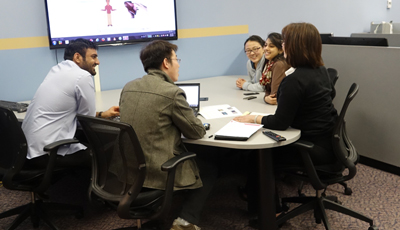Incorporating electronic learning — e-learning — in a blended learning environment continues to gain momentum on college campuses. In health care education, the idea is to help students grasp the content faster and retain it better using electronic and interactive tools, to ultimately benefit patient care.
Until now, students have played a limited role in curriculum in health education. But when UNMC students were asked for ideas to enhance curriculum, they stepped up with ideas.
|
|
As part of UNMC’s E-Learning Program, 20 students partnered with faculty, the subject matter experts, to help design curricula that are more engaging to students. In addition, 15 faculty members developed e-learning projects of their own to create a better learning experience.
Projects are supported by funding through Academic Affairs.
Students and faculty members will demonstrate 21 e-learning modules during Wednesday’s UNMC Innovations in Education E-Learning Showcase.
The event, which will be held in the College of Nursing Center for Nursing Science, also will include an awards ceremony with UNMC Chancellor Jeffrey P. Gold, M.D., and Dele Davies, M.D., vice chancellor for academic affairs.
View showcase agenda and presenter schedule here.
At UNMC, many students prefer to review information online at double speed or half speed, then use class time in more meaningful ways like problem solving, team-based learning and role-playing.
 |
Student innovators meet at the E-Learning Lab to work on e-learning modules. |
“We’re building momentum that will help our students be better prepared health care providers,” said Dr. Davies. “We’re focused on improving our teaching, discovering the best mode of learning for our students, and enabling faculty and students to be more engaged, test their best theories, and publish and disseminate them.”
Attendees at the showcase will see projects demonstrated such as how students can remember the hundreds of new medications that come on the market every year, how to prepare students who volunteer in the RESPECT Clinic and how to study range of motion using a 3-D avatar prototype.
Peggy Moore, UNMC e-learning instructional designer, said she’s impressed with the students and faculty she’s worked with.
“I’m working with the best people on campus; they’re real innovators,” Moore said. “They see how they can enhance medical education and improve it. Student-developed content is pretty avant-garde in higher education. There’s not much written or published about this type of content.”
